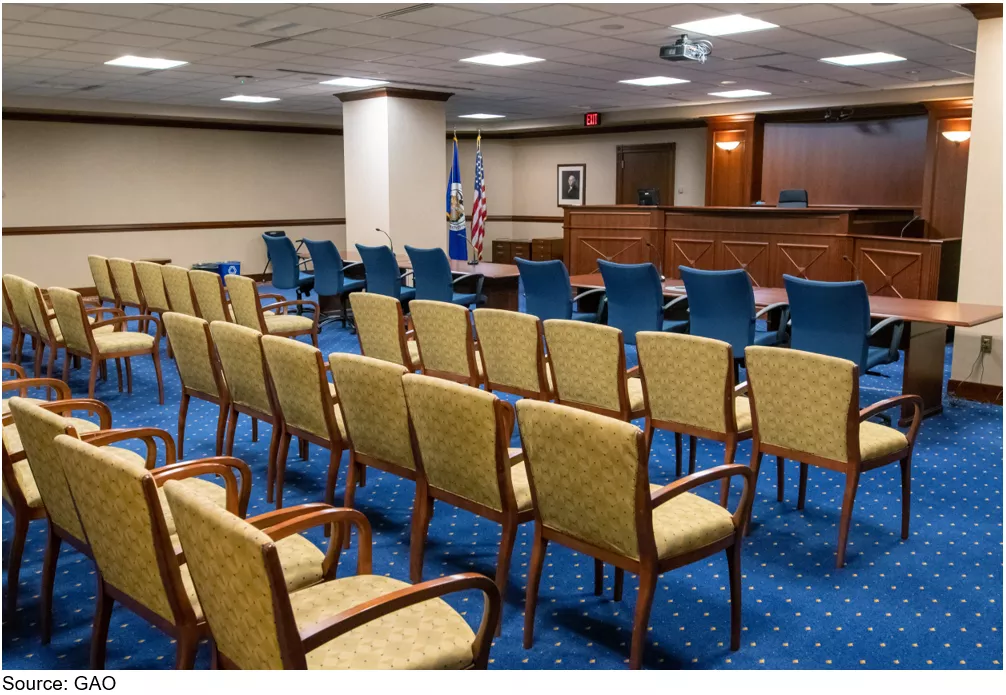Federal Contracts Are Highly Coveted—What Happens When There’s a Fight Over Them?
The federal government uses contracts to buy everything from the Coast Guard’s patrol cutters to coffee. Billions of taxpayer dollars are spent each year on these contracts. And for businesses big and small, winning a government contract can make your year.
But for businesses who don’t win, and think they should have, there’s a process to challenge those decisions. This is called a “bid protest.” GAO adjudicates these cases. And last fiscal year, we decided 1,740 of them.
Today’s WatchBlog post looks at our role with bid protests and how they work.
Bid Protest Hearing Room in GAO’s Washington, D.C. Headquarter Building
Image

What is a bid protest?
A bid protest is a challenge to a federal agency’s announcement seeking goods and services, often referred to as a “solicitation.” A bid protest can also be a challenge to a contract award. Bid protests are filed by a party that has a direct economic interest in the outcome of the procurement.
For nearly 100 years, GAO’s Office of the General Counsel has provided an impartial forum for resolving protests.
Businesses can file protests with us that challenge federal agencies’ procurement decisions. And we’ll review those decisions. But we do not resolve protests against nonfederal government agencies—such as state, local, or foreign governments—or actions by certain exempted federal agencies, such as the U.S. Postal Service.
You can learn about our decisions from FY 2024 by checking out our latest annual report to Congress.
Why are bid protests important?
The United States values fair and open competitions. The ability to protest federal government procurements helps to preserve these values by ensuring that competitors are treated fairly, and that the process is transparent and accountable. In turn, we can trust that this process results in the effective and efficient delivery of goods and services to the federal government and the American people.
As part of our work for Congress, we serve as a non-partisan arbiter of bid protest challenges. Congress trusts us to make decisions without regard to the parties involved. When reviewing bid protests, we look for whether the contract was awarded in a way that is consistent with federal procurement law.
Our main questions are: did the agency follow procurement law and did the agency treat companies fairly?
Who can file a bid protest?
Only "interested parties" may file protests. Typically, an interested party is a company seeking to provide the government with goods and services that the federal agency needs to buy. These companies have a direct economic interest in the procurement if they have a reasonable chance of winning the award of the contract.
When can an interested party file?
There are two points during the contracting process when protests can be filed—when an agency publishes its solicitation and when the contract is awarded. If your business does not win a contract or your offer to provide goods or services was not accepted by the agency, you might be able to file a protest. An attorney is not needed to file a protest. But only attorneys are permitted to have access to other companies’ confidential proprietary information.
A protest challenging the terms of a solicitation must be filed before the deadline for responding to the agency’s solicitation. In general, a protest challenging the award of a contract must be filed within 10 days of when a protester knows or should have known the basis of its protest.
If a protest is filed within certain timeframes, work for that contract is paused for the duration of the protest so that we can resolve the protest. This is required by law and is automatic. However, the agency can override that pause if there is an urgent need for the goods or services or if moving forward with the procurement is in the best interests of the government.
Regardless of whether the procurement is paused, we are required to issue a decision for each bid protest within 100 calendar days of when the protest is filed. We have always met our statutory deadline.
Where can interested parties file?
Protesters are required to use our Electronic Protest Docketing System for all new bid protests. Find more information about the filing process here.
You can learn more about our work on bid protests and how they work by visiting our webpage on GAO’s bid protest process and legal resources.
- GAO’s fact-based, nonpartisan information helps Congress and federal agencies improve government. The WatchBlog lets us contextualize GAO’s work a little more for the public. Check out more of our posts at GAO.gov/blog.
- Got a comment, question? Email us at blog@gao.gov.
GAO Contacts
Related Products

GAO's mission is to provide Congress with fact-based, nonpartisan information that can help improve federal government performance and ensure accountability for the benefit of the American people. GAO launched its WatchBlog in January, 2014, as part of its continuing effort to reach its audiences—Congress and the American people—where they are currently looking for information.
The blog format allows GAO to provide a little more context about its work than it can offer on its other social media platforms. Posts will tie GAO work to current events and the news; show how GAO’s work is affecting agencies or legislation; highlight reports, testimonies, and issue areas where GAO does work; and provide information about GAO itself, among other things.
Please send any feedback on GAO's WatchBlog to blog@gao.gov.




